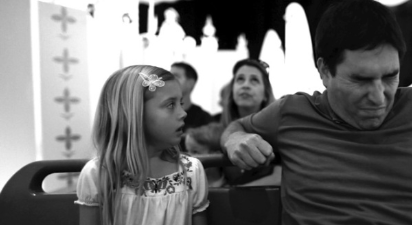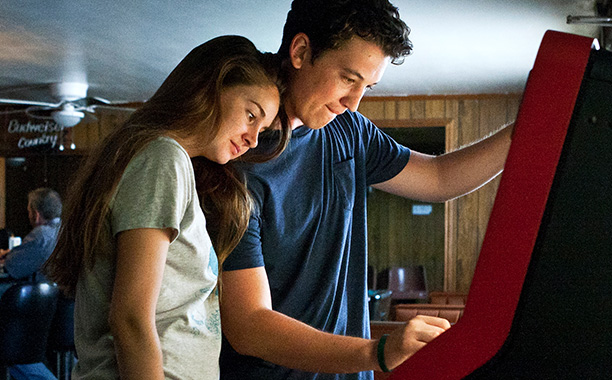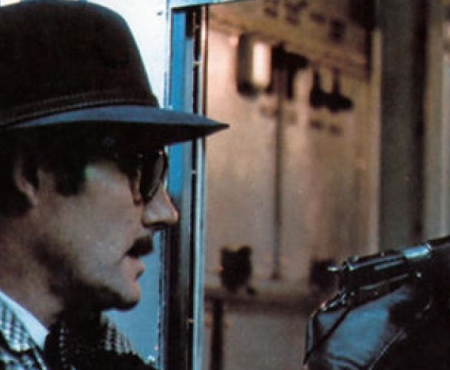Note: Since the past few days have been a hectic mess, the following post discusses Saturday and Sunday at the 15th annual Ebertfest.
…
Roger Ebert’s affinity for nuanced, daring, and compassionate cinema has perhaps never been more apparent than in this year’s Ebertfest lineup.
Saturday began with the Spanish silent film Blancanieves – a twist on the Snow White fairy tale – revolving around a female bullfighter attempting to weather through the struggles of her profession and her troubled past. Unlike The Artist, Blancanieves doesn’t drown itself in reverence or nostalgia for a bygone era of filmmaking. Instead it demonstrates what a modernized silent film can and should be. Aside from the content of the film, to watch Pablo Berger’s sophomore effort in the Virginia Theater, a theater made at the apex of the silent-film era, was a wonderfully surreal experience.
On tap after Blancanieves was Kumare, the only other film (along with The Ballad of Narayama) that I missed at the festival. Instead of attending the 84-minute social-experiment/documentary chronicling the life of an ostensibly wise guru who amassed a cult following in Arizona, I sat down and interviewed Slate’s resident movie critic Dana Stevens. Our discussion will be published on Movie Mezzanine within the coming days.
The afternoon transgressed into evening quite quickly. Before I knew it was time for Escape from Tomorrow – the infamous guerilla-style, twisted gothic fairy tale shot inside Disney World. Having seen the film this past January at Sundance (and not particularly liking it), I was curious to see whether my opinion of the film would change upon a second viewing. Much to my surprise, it did.
 Randy Moore’s directorial debut is still a mess (there’re an abundance of themes, ideas, and plot threads that have a beginning but no end). But its mercilessly candid satirization of the “happiest place on Earth,” juxtaposed with a disturbingly perverted surrealistic vision of the world’s most beloved theme park, is interesting and provocative enough to warrant a viewing. The novelty of Escape from Tomorrow – albeit a mediocre story about a family attempting to enjoy their last day of vacation at Disney world – makes Moore’s deeply cynical movie intrinsically fascinating.
Randy Moore’s directorial debut is still a mess (there’re an abundance of themes, ideas, and plot threads that have a beginning but no end). But its mercilessly candid satirization of the “happiest place on Earth,” juxtaposed with a disturbingly perverted surrealistic vision of the world’s most beloved theme park, is interesting and provocative enough to warrant a viewing. The novelty of Escape from Tomorrow – albeit a mediocre story about a family attempting to enjoy their last day of vacation at Disney world – makes Moore’s deeply cynical movie intrinsically fascinating.
After the bizarre nightmare of Escape from Tomorrow came The Spectacular Now (yet another film I caught at this year’s Sundance Film Festival). In what proved to be a complete antithesis to the film we had just been immersed in, James Ponsoldt’s raw and human approach to a “high school movie” proved to evocative and emotionally effective. The Spectacular Now works because it transcends the genre. It’s a more genuine and sincere look at the lives of high school students than anything John Hughes or Cameron Crowe made in the 80s.
Ponsoldt’s third film (after Smashed and Off the Black) will be distributed in wide-release August 2. My only hope is that the masses will flip for it. A full, superlatives-laced review, with actual plot detail, will be published here when the time comes.
 While Blancanieves, Escape from Tomorrow, and The Spectacular Now have virtually nothing in common when it comes to the films themselves, all three pieces of art are connected by something else: a Golden Thumb. Every film that plays at Ebertfest (which is solely determined by what Roger would like to showcase) is awarded the signature glistening thumb (an actual replica of Roger’s thumb) – but what the accolade means to each filmmaker is different. In my two years of attending the festival, the only common thread found in each filmmaker’s response is their appreciation of and admiration for Roger Ebert. Moore and Ponsoldt in particular discussed how they were raised on Siskel & Ebert in the 80s, obsessively tuning into their program each week to see what films they should sneak into that upcoming weekend. It was a simpler time.
While Blancanieves, Escape from Tomorrow, and The Spectacular Now have virtually nothing in common when it comes to the films themselves, all three pieces of art are connected by something else: a Golden Thumb. Every film that plays at Ebertfest (which is solely determined by what Roger would like to showcase) is awarded the signature glistening thumb (an actual replica of Roger’s thumb) – but what the accolade means to each filmmaker is different. In my two years of attending the festival, the only common thread found in each filmmaker’s response is their appreciation of and admiration for Roger Ebert. Moore and Ponsoldt in particular discussed how they were raised on Siskel & Ebert in the 80s, obsessively tuning into their program each week to see what films they should sneak into that upcoming weekend. It was a simpler time.
Sunday began as quickly as it ended. Walking into the Virginia Theater that morning to watch Not Yet Begun To Fight, an affirmatively apolitical documentary that dives into lives of American soldiers after war, was a bittersweet moment. As much as I wish it wasn’t so, it was time to head back home. All good things must come to an end, as they say.
The credits of Not Yet Begun To Fight was our cue that the 15th annual Ebertfest had ended. There was brief Q & A, followed by Chaz thanking everyone for attending, and assuring us that she’ll see us next year. We can only hope.
I tend to believe that all of us harbor some desire for a community that cares for our well being, isn’t afraid to challenge our opinions and beliefs, and respects and loves us for who we are. For some that might be a book club, a recreational sports team, a film society, or a simple gathering of friends at a bar once a month. For me, I’m starting to believe that Ebertfest may just be what I’ve been looking for all along.
Hopefully I’ll back next year and many more years to come.
Until then, the balcony is closed.




















